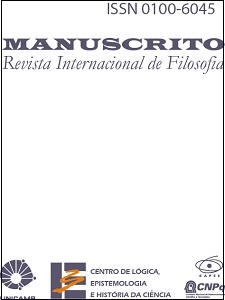Resumo
Este artigo procura conectar a noção de ego absoluto enquanto subjetividade última da consciência na tradição continental com a fenomenologia da matemática do contínuo (MC) tal como este termo foi estabelecido seguindo as idéias pioneiras de Cantor sobre as propriedades e cardinalidade de conjuntos. Minha motivação deriva basicamente das ambigüidades subjacentes à natureza e propriedades desta noção matemática fundamental as quais, no meu entender, não podem, em princípio, ser resolvidas pelos meios analíticos de qualquer linguagem formal e nem mesmo pela adição de novos axiomas a um sistema axiomático consistente de primeira ordem como a teoria de conjuntos de Zermelo Fraenkel (ZF). Neste tratamento fenomenológicamente motivado eu lido em certa medida com a indecidibilidade de uma tese fundamental sobre a cardinalidade do contínuo em ZFC, a saber, a Hipótese do Contínuo, e também com aquilo que está na base do primeiro resultado de incompletude de Gödel.Referências
COHEN, P. Set Theory and the Continuum Hypothesis. Reading, Mass.: W.A. Benjamin, 1966.
DRAKE, F. SINGH, D. Intermediate Set Theory. Chichester: J. Wiley & Sons, 1996.
ENDERTON, H. A Mathematical Introduction to Logic. New York: Academic Press, 1972.
FEFERMAN, S. “Does mathematics need new axioms?”. American Mathematical Monthly, 106, pp. 99-111, 1999.
FØLLESDAL, D. “Gödel and Husserl”. In: Naturalizing Phenomenology. Stanford: Stanford Univ. Press, pp. 385-400, 1999.
GÖDEL, K. “What is Cantor’s Continuum Problem”. The American Mathematical Monthly, 54(9), pp. 515-25, 1947.
HEELAN, P. Space-Perception and the Philosophy of Science. Berkeley: University of California Press, 1988.
HUSSERL, E. Die Krisis der europäischen Wissenschaften und die transzendentale Phänomenologie. Transl. D. Carr. Evanston: Northwestern University Press, 1970.
HUSSERL, E. Ideen zu einer reinen Phänomenologie und phänomenologischen Philosophie. Erstes Buch, Husserliana, Band III/I. Dordrecht: Kluwer Acad. Pub., 1995.
HUSSERL, E. Zur Phänomenologie des inneren Zeitbewusstseins. Transl. H. Dussort. Paris: Ed. PUF, 1996.
HUSSERL, E. Die Bernauer Manusckripte über das Zeitbewußtsein (1917/18), herausg. R. Bernet & D. Lohmar. Dordrecht: Kluwer Acad. Pub., 2001.
KLEENE, S.C. Introduction to Metamathematics. New-York: North-Holland Pub.Co, 1980.
KUNEN, K. Set Theory. An Introduction to Independence Proofs. Amsterdam: Elsevier Sc. Pub., 1982.
LOHMAR, D. “Elements of a Phenomenological Justification of Logical Principles, including an Appendix [...] on the Transfiniteness of the Set of Real Numbers”. Philosophia Mathematica, 10(3), pp. 227- 250, 2002.
POPPER, K. Logik der Forschung. Wien: Springer, 1934.
SARTRE, J. P. L’être et le néant. Paris: Ed. Gallimard, 1943.
SHOENFIELD, J. Mathematical Logic. Reading, Mass.: Addison Wesley Pub., 1967.
TIESZEN R. “Mathematical Intuition and Husserl’s Phenomenology. Noûs, 18(3), pp.395-421, 1984.
VAN ATTEN, M. VAN DALEN, D. TIESZEN, R. “Brouwer and Weyl: The Phenomenology and Mathematics of the Intuitive Continuum”. Philosophia Mathematica, 10(3), pp. 203-226, 2002.
VAN DALEN, D. VAN ATTEN, M. “Arguments for the Continuity Principle”. The Bul letin of Symbolic Logic, 8(3), pp. 309-347, 2002.

